2 Dec 2010
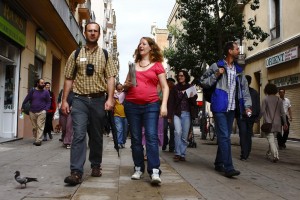
Members of Transition Town Barcelona head off on their 'Caminata'
In Europe, exciting news from Ferney-Voltaire, which has decided to become a Transition Town and they’ve just started their awareness raising activities, so welcome to them. SQYenTransition in France have this great project with the lovely name of verger dans ma ville…an orchard in my city. And for an idea worth sharing, have a look at Transition Town Barcelona’s La Caminata, or Transition Walkabout…a nice idea that helps you get to know your town and community more, and helps them to get to know about you too.
Read more»
23 Nov 2010
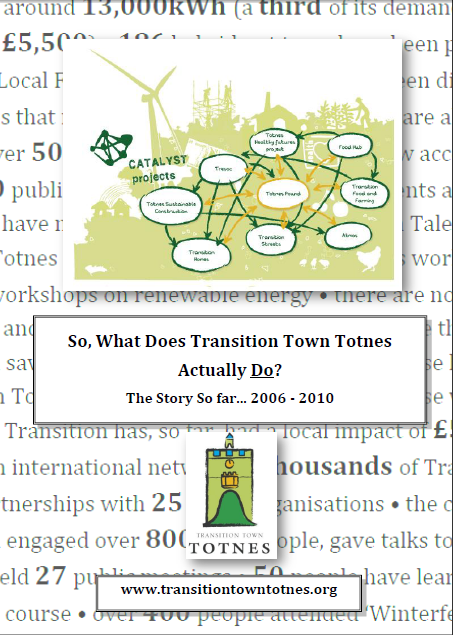 Transition Town Totnes has been running now for just over 4 years, and recently a group of us sat down to try and capture what has actually been achieved by the process. It has been a very illuminating process, one that is very useful to do in terms of being able to get a sense of what has actually been achieved on the ground (I highly recommend it). The name of the report, ‘So, what does Transition Town Totnes actually do?‘, comes from the question often asked by visitors to the town who come to see a Transition town, wander round the High Street and wonder why there are still cars and not windmills everywhere. This report is designed to explain all that is going on below the surface (as well as on top of it…).
Transition Town Totnes has been running now for just over 4 years, and recently a group of us sat down to try and capture what has actually been achieved by the process. It has been a very illuminating process, one that is very useful to do in terms of being able to get a sense of what has actually been achieved on the ground (I highly recommend it). The name of the report, ‘So, what does Transition Town Totnes actually do?‘, comes from the question often asked by visitors to the town who come to see a Transition town, wander round the High Street and wonder why there are still cars and not windmills everywhere. This report is designed to explain all that is going on below the surface (as well as on top of it…).
Read more»
9 Nov 2010
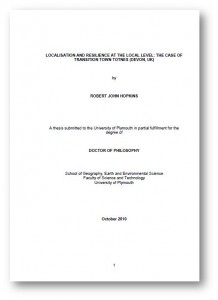 Three years in the making, I am delighted to announce the completion and availability of my PhD thesis, which offers the most in-depth study yet of the Transition concept in practice. It can now be ordered here. Exhaustively referenced and comprehensive in its analysis of the thinking underpinning Transition and of its impacts in practice (running to over 90,000 words), ‘Localisation and Resilience’ is a pivotal addition to the literature on this fast-growing response to peak oil and climate change. It takes as its focus the Devon town of Totnes, the UK’s first Transition initiative, looking in detail, using interviews, oral history, focus groups, surveys, World Cafe and Open Space methods, at the impact Transition Town Totnes has had during its four year existence. It also takes a detailed look at the literature on resilience, and argues that the combination of resilience thinking, localisation and social enterprise offer a powerful tool for the economic revival of communities and for achieving a low carbon economy. If you are interested in resilience, sustainability, Transition, and the future of local economies, this is an essential new publication.
Three years in the making, I am delighted to announce the completion and availability of my PhD thesis, which offers the most in-depth study yet of the Transition concept in practice. It can now be ordered here. Exhaustively referenced and comprehensive in its analysis of the thinking underpinning Transition and of its impacts in practice (running to over 90,000 words), ‘Localisation and Resilience’ is a pivotal addition to the literature on this fast-growing response to peak oil and climate change. It takes as its focus the Devon town of Totnes, the UK’s first Transition initiative, looking in detail, using interviews, oral history, focus groups, surveys, World Cafe and Open Space methods, at the impact Transition Town Totnes has had during its four year existence. It also takes a detailed look at the literature on resilience, and argues that the combination of resilience thinking, localisation and social enterprise offer a powerful tool for the economic revival of communities and for achieving a low carbon economy. If you are interested in resilience, sustainability, Transition, and the future of local economies, this is an essential new publication.
Read more»
1 Nov 2010
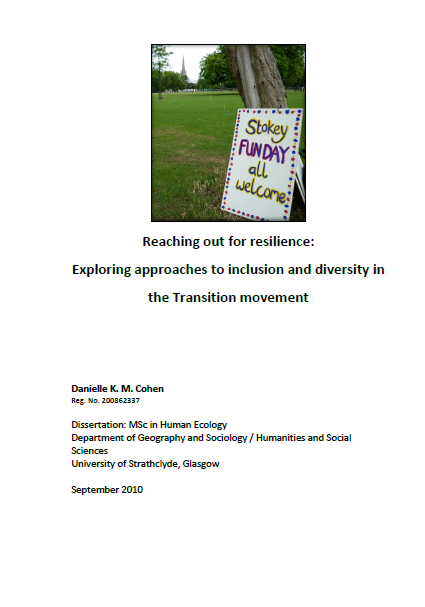 The number of pieces of quality research being conducted about Transition continues to grow. Here is a new one by Danielle K. M. Cohen at the University of Strathclyde, Glasgow, as part of her dissertation for her MSc in Human Ecology. Entitled “Reaching out for resilience: Exploring approaches to inclusion and diversity in the Transition movement” it is a very useful study about inclusion and diversity. Here’s a sample quote from the conclusion: “people in Transition – in this study at least – often talk about inclusion with a view to bringing different people into the movement. I have argued that this view of inclusion can imply and perpetuate hierarchical power relationships underpinned by assumptions of assimilation and integration. As one co-operative inquiry participant put it, Transition should perhaps not be seeking to include others but should be seeking to be included by them”. You can download the full thesis here: my thanks to Danielle for allowing me to post this.
The number of pieces of quality research being conducted about Transition continues to grow. Here is a new one by Danielle K. M. Cohen at the University of Strathclyde, Glasgow, as part of her dissertation for her MSc in Human Ecology. Entitled “Reaching out for resilience: Exploring approaches to inclusion and diversity in the Transition movement” it is a very useful study about inclusion and diversity. Here’s a sample quote from the conclusion: “people in Transition – in this study at least – often talk about inclusion with a view to bringing different people into the movement. I have argued that this view of inclusion can imply and perpetuate hierarchical power relationships underpinned by assumptions of assimilation and integration. As one co-operative inquiry participant put it, Transition should perhaps not be seeking to include others but should be seeking to be included by them”. You can download the full thesis here: my thanks to Danielle for allowing me to post this.
Read more»
1 Nov 2010
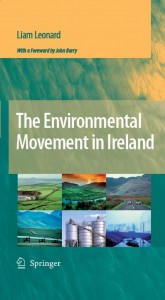 I have just been looking at the online version (which is pretty restrictive, but you get the general idea) of Liam Leonard’s new book ‘The Environmental Movement in Ireland’. It offers a very well researched overview of the evolution of the green movement politically in Ireland, the rise of protest culture through campaigns such as The Glen of the Downs roads protest, the Rossport 5 and the various anti-incineration and anti-nuclear campaigns. As such, it is a very detailed and comprehensive look at those aspects of the green presence in Ireland, but it strikes me that one key part of that story is missing. So far as I could tell, there is nothing that documents the movement that was developing in parallel which focused on solutions, on practically modelling solutions, often at great personal and financial cost. This morning then, I want to take a stab at what that chapter might have included.
I have just been looking at the online version (which is pretty restrictive, but you get the general idea) of Liam Leonard’s new book ‘The Environmental Movement in Ireland’. It offers a very well researched overview of the evolution of the green movement politically in Ireland, the rise of protest culture through campaigns such as The Glen of the Downs roads protest, the Rossport 5 and the various anti-incineration and anti-nuclear campaigns. As such, it is a very detailed and comprehensive look at those aspects of the green presence in Ireland, but it strikes me that one key part of that story is missing. So far as I could tell, there is nothing that documents the movement that was developing in parallel which focused on solutions, on practically modelling solutions, often at great personal and financial cost. This morning then, I want to take a stab at what that chapter might have included.
Read more»


 Three years in the making, I am delighted to announce the completion and availability of my PhD thesis, which offers the most in-depth study yet of the Transition concept in practice. It can now be ordered
Three years in the making, I am delighted to announce the completion and availability of my PhD thesis, which offers the most in-depth study yet of the Transition concept in practice. It can now be ordered  The number of pieces of quality research being conducted about Transition continues to grow. Here is a new one by Danielle K. M. Cohen at the University of Strathclyde, Glasgow, as part of her dissertation for her MSc in Human Ecology. Entitled “Reaching out for resilience: Exploring approaches to inclusion and diversity in the Transition movement” it is a very useful study about inclusion and diversity. Here’s a sample quote from the conclusion: “people in Transition – in this study at least – often talk about inclusion with a view to bringing different people into the movement. I have argued that this view of inclusion can imply and perpetuate hierarchical power relationships underpinned by assumptions of assimilation and integration. As one co-operative inquiry participant put it, Transition should perhaps not be seeking to include others but should be seeking to be included by them”. You can download the full thesis
The number of pieces of quality research being conducted about Transition continues to grow. Here is a new one by Danielle K. M. Cohen at the University of Strathclyde, Glasgow, as part of her dissertation for her MSc in Human Ecology. Entitled “Reaching out for resilience: Exploring approaches to inclusion and diversity in the Transition movement” it is a very useful study about inclusion and diversity. Here’s a sample quote from the conclusion: “people in Transition – in this study at least – often talk about inclusion with a view to bringing different people into the movement. I have argued that this view of inclusion can imply and perpetuate hierarchical power relationships underpinned by assumptions of assimilation and integration. As one co-operative inquiry participant put it, Transition should perhaps not be seeking to include others but should be seeking to be included by them”. You can download the full thesis  I have just been looking at the online version (which is pretty restrictive, but you get the general idea) of Liam Leonard’s new book
I have just been looking at the online version (which is pretty restrictive, but you get the general idea) of Liam Leonard’s new book
